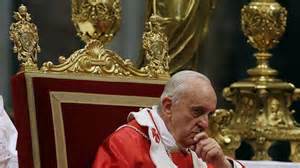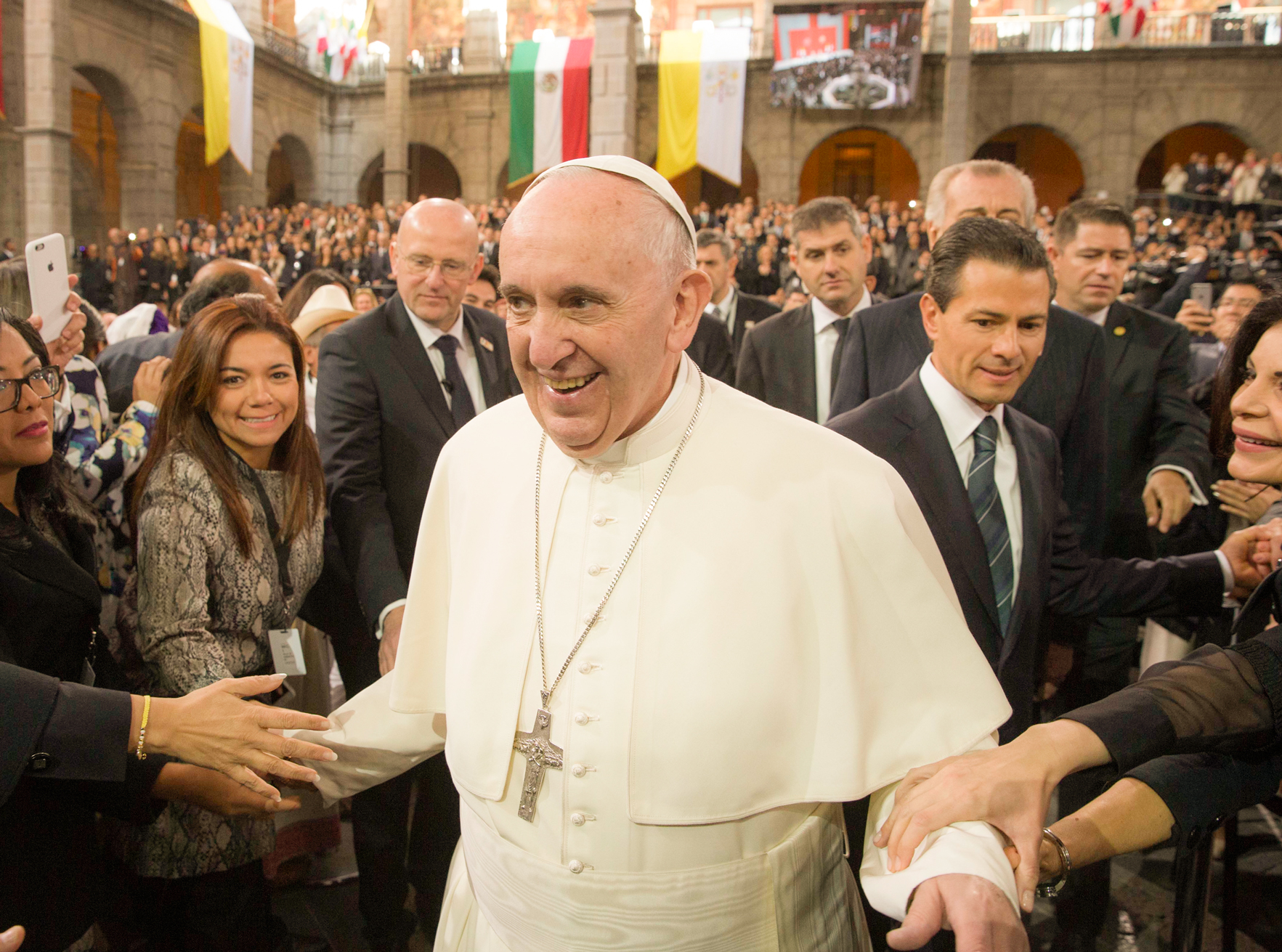Pope Francis insists that we live in an “economy of exclusion and inequality” governed by “the laws of competition and the survival of the fittest, where the powerful feed upon the powerless,” justified by those who “continue to defend trickle-down theories which assume that economic growth, encouraged by a free market, will inevitably succeed in bringing about greater justice and inclusiveness in the world.” These statements on the economy in his recent Apostolic Exhortation Evangelii Gaudium have inevitably set off a firestorm of commentary, some accusing the pope of making “rather questionable” assumptions about the free market or even of being a “Marxist,” some claiming that the pope is not really critiquing free markets at all, and others praising Francis for his focus on the economic structures that exclude the poor.
Pope Francis’s Catholic critics in particular seem to imply that his statements on capitalism represent a departure from what his two predecessors Popes John Paul II and Benedict XVI taught on the economy, signaling what one could call a lurch to the Left. Yet Francis himself insists that his statements should be interpreted in light of the broader treatment of these issues in the Compendium of the Social Doctrine of the Church (#184), which is decidedly shaped by the teaching of John Paul II, so we owe it to the pope to try to interpret his comments in the context of this broader tradition. It may be that if and when Pope Francis writes a more developed social encyclical we will see distinct emphases or even developments in the Catholic Church’s social teaching, but here I believe that a “hermeneutic of continuity” is in order. Of course, other statements in the document not related to the economy do represent a more decisive change in direction, but those are not my concern here. In this post I want to explore the relationship between the economy and culture in recent Catholic social teaching and how that is reflected in Evangelii Gaudium, and in a later post I will look at the relationship between the economy and the state.
A key tenet of recent Catholic teaching on the economy is that the economy is first and foremost a culture, or perhaps better, the economy is always embedded in a culture. For example, when describing the consumerism, environmental degradation, and breakdown of the family that he associates with the modern economy, John Paul II in his 1991 encyclical Centesimus Annus writes that:
These criticisms are directed not so much against an economic system as against an ethical and cultural system. The economy in fact is only one aspect and one dimension of the whole of human activity. If economic life is absolutized, if the production and consumption of goods become the centre of social life and society’s only value, not subject to any other value, the reason is to be found not so much in the economic system itself as in the fact that the entire socio-cultural system, by ignoring the ethical and religious dimension, has been weakened, and ends by limiting itself to the production of goods and services alone. (#39)
Catholic neoconservatives such as Michael Novak and George Weigel have interpreted this passage to mean that John Paul attributes social ills such as consumerism not to the free market economy itself, but to a distinct cultural sphere. A vital cultural sphere provides the virtues necessary for a healthy market economy, and together with the modest regulation provided by the political sphere, puts in place moral limits on the free economy. Although there is some truth to this, as I have argued elsewhere at greater length, a better reading of this passage is that the economy is “one aspect” of a larger whole, the “entire socio-cultural system.” All economic systems are reflections of and permeated by underlying cultures, which are “basically different ways of facing the question of the meaning of personal existence” (#24). What John Paul identifies as the problem is when the part, the economic system, becomes the organizing principle for the whole, the cultural system.
Pope Benedict XVI’s 2009 encyclical Caritas in Veritate makes this point more explicitly. For example, he writes that the economy should be governed not only by the commutative justice regulating commercial exchange, but also by distributive and social justice, “not only because it [i.e., the economy] belongs within a broader social and political context, but also because of the wider network of relations within which it operates” (#35). He later adds, “It must be remembered that the market does not exist in the pure state. It is shaped by the cultural configurations which define it and give it direction” (#36). Note this last point, that culture not only gives direction to the market economy, as the neoconservatives would admit, but defines its nature.
 So turning back to Pope Francis, a close reading of his statements shows that he would agree that his criticisms are “directed not so much against an economic system as against an ethical and cultural system.” For example, he refers to consumerism as the “culture of prosperity” (#54) and the “throw-away culture” (#53) and states that the “economy of exclusion and inequality” is defined primarily by a (cultural) vision of “what it means to be a part of the society in which we live” in which the poor are “leftovers” (#53). It is worth reiterating, however, that just because Francis’s criticism is primarily cultural, this does not mean that he is not critiquing the workings of our economic system; rather, the injustices we find in the contemporary economy reflect a sick culture.
So turning back to Pope Francis, a close reading of his statements shows that he would agree that his criticisms are “directed not so much against an economic system as against an ethical and cultural system.” For example, he refers to consumerism as the “culture of prosperity” (#54) and the “throw-away culture” (#53) and states that the “economy of exclusion and inequality” is defined primarily by a (cultural) vision of “what it means to be a part of the society in which we live” in which the poor are “leftovers” (#53). It is worth reiterating, however, that just because Francis’s criticism is primarily cultural, this does not mean that he is not critiquing the workings of our economic system; rather, the injustices we find in the contemporary economy reflect a sick culture.
Therefore, those criticisms, such as that of Samuel Gregg linked to above and that of Robert Sirico, that argue that “the absolute autonomy of the marketplace and financial speculation” (#56) described by Pope Francis does not actually exist in the real world miss the point. Nothing in the document suggests that the pope thinks that it does in a pure form; instead, what the pope sees is that a cultural mindset that denies any ethical restraints on the market activity of the well-off, and that sees the vulnerable as “consumer goods to be used and then discarded” (#53), is having a profound impact on the global economy, to the detriment of human well-being. Gregg’s criticism that very few people actually subscribe to the absolutist market fundamentalism described by Francis, whose adherents supposedly “reject the right of states, charged with vigilance for the common good, to exercise any form of control” (#56, emphasis mine), has more merit. I think, however, that the point here is that a good deal of the behavior of our economic elites reflects a mindset that tends toward this extreme, even though if those elites were pinned down on their precise views on the proper role of the government, they would not be “anarcho-capitalists.”
Others are interpreting Francis’s statements in an overly individualistic way. For example, Father John Zuhlsdorf (“Fr. Z”) writes: “No economic plan will solve the problems of the poor by itself. Economic plans must be carried out by people who have good, solid morals and values. I submit that these morals and values must be rooted in religion.” Now this is obviously true, but I don’t think this is all that Pope Francis is saying. I believe that interpretations such as this go back to the particularly neoconservative way of interpreting Centesimus Annus, in which individuals carry moral virtues inculcated in the cultural sphere into the economic sphere. In this view, the injustices we find in the capitalist economy are the result of the individual vices which are permitted in a free market. For example, neoconservatives such as the late Richard John Neuhaus understood consumerism as just another way of talking about the vice of greed.
This way of looking at things is problematic for two reasons. First, John Paul himself describes consumerism as a “structure of sin” (#38), meaning that it is a reality with a pervasive social influence that cannot be reduced to individual vice. As the interpreter of Catholic social teaching Donal Dorr writes in his book Option for the Poor, when speaking about Pope Paul VI’s document Evangelii Nuntiandi:
The most important structures in our world are our patterns of thinking and feeling and valuing. These are deeply personal; yet in many respects they transcend the individual. They are social realities that are often our unexamined presuppositions. They are ‘within’ the person without being private. They are a crucial part of the ‘strata’ of the human race that are to be evangelised and transformed.
That is exactly what John Paul means by describing consumerism as a structure of sin.
Second, it is not clear how the infusion of individual virtue into the market could transform the economy in any substantial way. Neoconservative writers tend to see the moral virtue developed in the cultural sphere as reinforcing the virtues needed in the marketplace such as hard work and diligence. Pope Benedict in particular, however, makes it clear that something more than this is needed. He writes, “The Church’s social doctrine holds that authentically human social relationships of friendship, solidarity and reciprocity can also be conducted within economic activity, and not only outside it or ‘after’ it” (#36). Friendship, solidarity, and reciprocity are reflections of what Benedict calls the logic of gratuitousness, or the logic of gift, which he sees as primarily arising in civil society. But, he insists, this logic of gratuitousness must expand from civil society into economic life, as well (#38). And by its very nature the logic of gratuitousness cannot be reduced to an interior disposition, to personal virtue, but must take concrete form within the economy. This is why Pope Benedict puts so much emphasis on alternative forms of business enterprise, such as mutualist enterprises in which the workers share in the ownership of the company (#38), or the Economy of Communion model (#46) in which a portion of a company’s profits are given directly to the poor.
These ways of thinking are reflected in Evangelii Gaudium. For example, Francis explores the complex relationship between convictions and structural transformation: “convictions and habits of solidarity, when they are put into practice, open the way to other structural transformations and make them possible. Changing structures without generating new convictions and attitudes will only ensure that those same structures will become, sooner or later, corrupt, oppressive and ineffectual” (#189). Francis also agrees with Benedict that the transformation of the workplace is fundamental for a just economy: “it is through free, creative, participatory and mutually supportive labour that human beings express and enhance the dignity of their lives” (#192).
So what does Pope Francis propose to remedy the ills of the global economy? If not a Marxist, is he a socialist? In a later post I will explore the role of the state in the economy in recent Catholic teaching, and how this is reflected in Evangelii Gaudium.





Trackbacks/Pingbacks